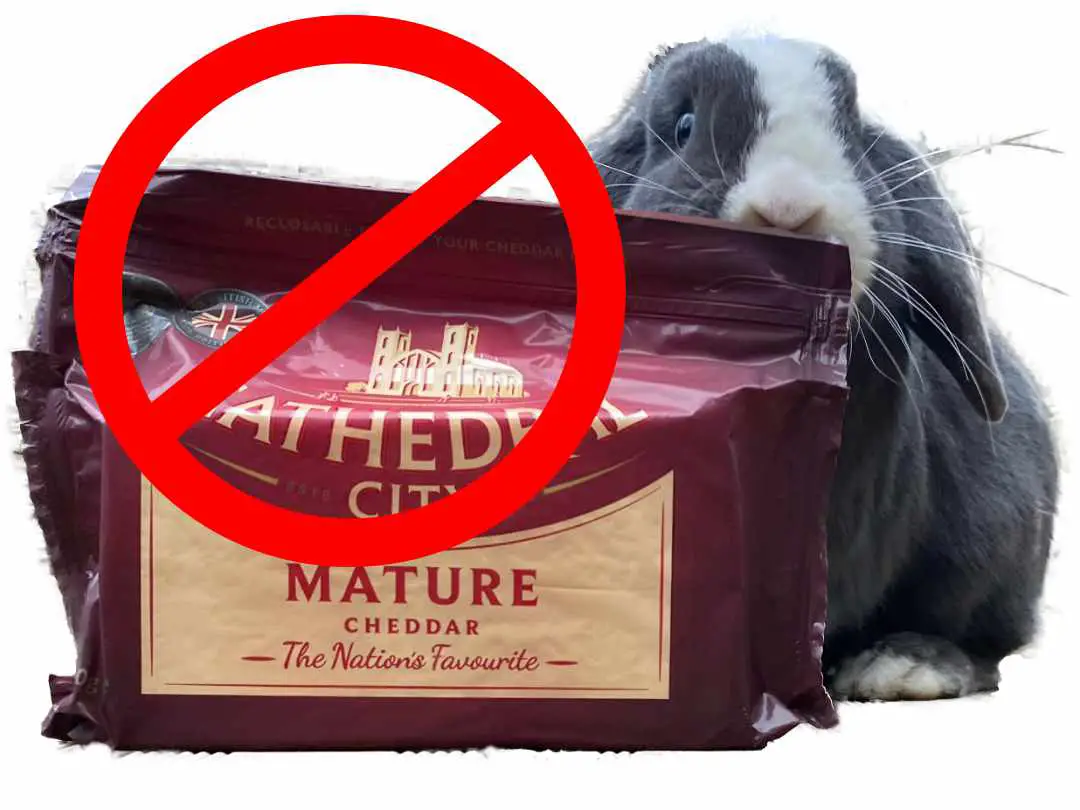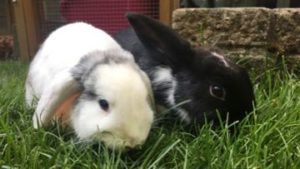What’s your favourite cheese?
Mine is a good, ripe, creamy brie. Or a strong mature cheddar. Then again, I love the salty tang of roquefort. And I’ve always loved the crumbliness of Wensleydale.
OK, I admit it. I love cheese. Pretty much all types, preferably with some Carr’s water biscuits (the best cheese biscuits. No arguments, please).
But can you share this pleasure with your fluffy bunny friends, and should you worry if your rabbit finds some cheese and nibbles it?
I’ve spent hours researching how safe or not it is for rabbits to eat cheese, including consulting scientific journal articles, to make sure that you can get reliable information. Read on for a full guide to rabbits and cheese in their diet, but if you want the headline answer, here it is.
Can rabbits eat cheese?
Rabbits should not eat cheese. You should not feed cheese to bunnies, because cheese is high in fats with no fibre – while rabbits need food (like grass) low in fats with lots of fibre. Dairy products like cheese also contain lactose, which rabbits can’t digest. Cheese isn’t poisonous (toxic) to bunnies, but eating too much could lead to serious intestinal problems.
Cheese, nutrition and rabbits
| Ingredient | Cheese per 100g | Rabbit nutritional requirements per 100g | Comments |
|---|---|---|---|
| Energy | 429 kcal | ||
| Protein | 25 g | 12-17 g | Cheese is too high in protein for rabbits. |
| Fat | 35.71 g | 2.5-5 g | Rabbits normally eat little to no fat – cheese has loads. The rabbit digestive system isn’t designed to cope with high fat levels. |
| Carbohydrate | 0 | Less than 20 g | While rabbits don’t need extremely high levels of carbohydrates, cheese has little or none. |
| Fibre | 0 | 14-25 g | Rabbits need loads of fibre in their diet – it enables their guts to keep food moving. Cheese has no fibre at all. |
| Calcium | 714 mg | 500 mg (max. 1,000 mg) | Cheese is high in calcium. But too much calcium is bad for bunnies – they end up getting painful kidney stones |
| Sodium | 679 mg | 100 mg (max. 800 mg) | Cheese is too high in sodium. Just as too much salt is bad for humans, it’s bad for bunnies too. |
| Vitamin A | 1786 IU | 1,000-1,200 IU | While rabbits need vitamin A, too much is potentially bad for them. |
| Lactose | 0.1 g | Adult rabbits can’t process lactose. |
As the table shows, rabbits need a diet with low fat, not too much calcium, and plenty of fibre. Cheese is high fat, with lots of calcium, and no fibre. Rabbits’ digestive systems just aren’t set up for cheese.
Why is eating cheese bad for rabbits?
Four key reasons mean that cheese is bad for bunnies and you shouldn’t feed it to them:
Cheese is too high in fat
Cheese has too much fat for rabbits. Rabbits are designed to eat grass and other vegetation, which has very little fat in it. That means that their digestive systems aren’t geared up to high fat food.
When rabbits eat food with high fat content, it is more likely to create problems, including gas, bloating and indigestion. Bad bacteria in the intestines feed on the fats, producing gas and causing discomfort to the bunny.
Cheese is too high in proteins
Food normally eaten by rabbits contains vegetable proteins in relatively low quantities (up to about 17% of the food). Cheese contains animal proteins in much higher proportions (eg, 25% of the food).
So cheese has the wrong proteins for rabbits and in too high quantities.
Again, this can cause problems for the rabbit’s gut as it tries to process these proteins. It is being faced with an unusual mix of amino acids (the building blocks of proteins) and in higher than usual quantities.
Cheese is too low in fibre
Rabbits normally eat food with loads of fibre – like grass and hay. Their bodies have specially adapted to deal with this, with digestive systems capable of breaking down fibre. The fibre also helps the gut to keep the food moving, so it doesn’t block up and cause constipation.
Cheese has no fibre. This means that, if a rabbit ate a lot of cheese, their guts have nothing to help keep the food moving. It can all start blocking up, leading to a constipated rabbit.
If a human is constipated, that’s uncomfortable.
But if a rabbit is constipated, it can be fatal. Rabbits have extremely sensitive digestive systems, and any type of constipation can lead to GI stasis, which can be serious for rabbits.
If you suspect your rabbit has GI stasis, consult a vet immediately.
Cheese contains lactose
Cheese contains lactose, a type of sugar that rabbits can’t digest. Here’s why:
Cheese, like all foods made from milk, contains lactose. Lactose is a type of complex sugar found in milk. To benefit from it, your body needs to be able to break it down to two simpler sugars, glucose and galactose.

Baby animals (including humans) have a special enzyme that does this, called lactase, so that they can benefit from their mother’s milk. But as animals get older, and start weaning, their bodies stop making lactase. So most adult mammals can’t digest lactose.
Humans are unusual – about half of the world’s population keep on producing lactase as adults. It’s a genetic variation, that may have arisen when humans first started dairy farming. More commonly, people with european, parts of asian and parts of African heritage are able to process lactose as adults.
But you’ll know yourself that some people are lactose-intolerant – if they have milk, it gives them indigestion. Their bodies just can’t work on the lactose in milk.
Rabbits are like most other animals (and in fact, even rabbit milk for baby rabbits is unusually low in lactose) – once a rabbit stops weaning, it can’t process lactose.
Cheese isn’t as high as many other dairy products in lactose (regular cows’ milk can be as high as 6.3 g /100g of lactose), but it still contains some (ricotta and cream cheese are pretty high; parmesan cheese has almost none).
Bunnies, like many humans, are lactose-intolerant – they don’t have the lactase enzyme to break down the sugar. So the lactose is likely to give them indigestion.
But stomach problems are more serious for bunnies than for humans:
- First, they are unable to vomit if they feel ill.
- Secondly, their systems are much more delicate.
The lactose, along with the high levels of fat and lack of fibre, can lead to gut problems, including GI stasis, which needs immediate attention. If you think your bunny is having difficulties, consult a vet.
Help – my bunny ate some cheese! What should I do?
If your rabbit just nibbled a small amount of cheese, it is unlikely to have done them any harm. They have just eaten a small, unhealthy snack.
If your rabbit has eaten a larger amount of cheese, make sure that you observe them closely over the next 24 hours. Check that they are behaving normally, moving around, and eating as normal.
Also check their poo – does this look normal?
If the rabbit is showing any signs of distress, including moving less, or eating less, then consult a vet immediately.
What diets should rabbits have?
The best diet for rabbits is plenty of hay and water. Everything else is less important than these two. The best hay for rabbits is timothy hay (I explain why in this post).
Bunnies should also be fed some fresh greens every day (about a handful), and about an eggcup-full of pellets (also known as nuggets). You can check which herbs are safe for rabbits here.
You can also give them an occasional treat – small amounts of fruit make a great treat. I have a long list of suitable fruit in this post.
Conclusion
Rabbits shouldn’t eat cheese. It’s not good for them at all. Rabbit digestive systems aren’t designed for dairy products. Feed your bunnies hay, water and greens rather than cheese.
Check out these other posts
You can find out more about vitamins and minerals for rabbits in this post.
If you’re worried about your bunny, consider getting them insured. That way, you won’t have to worry too much about the cost if you need to consult a vet. If you’re based in Britain, I have a comparison of all the UK rabbit insurance providers.


